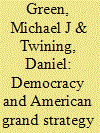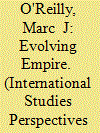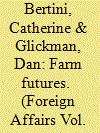|
|
|
Sort Order |
|
|
|
Items / Page
|
|
|
|
|
|
|
| Srl | Item |
| 1 |
ID:
080907


|
|
|
|
|
| Publication |
2008.
|
| Summary/Abstract |
Has democracy promotion been discredited as a central theme of American foreign policy after the US experience in Iraq? Many American critics and friends overseas appear to believe so. It would be wrong, however, to believe that the ideational approach of American foreign policy will diminish, particularly in Asia. First, there is not in fact a tension between the United States' material power and its ideals as a democracy. Second, post-Bush leaders identify and embrace the promotion of bilateral and multilateral cooperation among Asia-Pacific democracies as central to the United States' regional strategy. Third, and most important, democracy promotion and security cooperation among like-minded democracies will remain a central objective of American foreign policy in Asia because those elements magnify American power and facilitate US goals. In short, the ideational balance of power in Asia directly affects the material balance of power. This article examines these trends in American policy in Asia, the outlook for greater strategic and diplomatic cooperation among regional democracies, and the implications for the region, including China and ASEAN, of a US democracy-based approach to Asia policy.
|
|
|
|
|
|
|
|
|
|
|
|
|
|
|
|
| 2 |
ID:
077533


|
|
|
|
|
| Publication |
2007.
|
| Summary/Abstract |
This article examines U.S. policy in the Persian Gulf and juxtaposes American efforts in Iraq with those in the Gulf Cooperation Council states. As the U.S.-led effort to pacify and democratize Iraq continues to founder and with civil war underway in parts of the country, Washington pursues another imperial strategy in the Persian Gulf better suited to American security preferences and more likely to succeed, at least in the short term. In pursuing an "emirates" strategy, Washington seeks to indulge its historic preference for an informal empire in the Gulf that relies on cooperation with pro-American monarchs. While the Bush administration has touted Iraq's potential to remake the Middle East into a democratic haven, America seems prepared to rely on familiar autocrats to help it tackle terrorists in Southwest Asia and preserve Western access to critical supplies of hydrocarbons should Iraq's democratic rehabilitation prove unsuccessful
|
|
|
|
|
|
|
|
|
|
|
|
|
|
|
|
| 3 |
ID:
089281


|
|
|
|
|
| Publication |
2009.
|
| Summary/Abstract |
It is not easy for Americans to understand the starvation that afflicts much of the developing world. Families in the poorest parts of Africa and Asia spend up to 80 percent of their incomes on food; for the average U.S. household, that would mean an annual grocery bill of $40,000. Yes, there are hungry Americans in the millions, and the U.S. food-stamp program is operating at record levels. But hunger in the United States does not put tens of thousands of infants into hospitals and require them to be hooked up to feeding tubes. Nor does it lead to stunting, wasting, and debilitating forms of malnutrition, such as kwashiorkor and marasmus.
|
|
|
|
|
|
|
|
|
|
|
|
|
|
|
|
| 4 |
ID:
083999


|
|
|
|
|
| Publication |
2008.
|
| Summary/Abstract |
This project is an integrated quantitative and qualitative examination of the influences on U.S. foreign policy toward a sample of Middle East states (Israel, Iraq, and Saudi Arabia) over the last quarter century. Examinations of general trends in the relationships between these dyads, regression analyses, and brief case studies look at a number of factors contributing to the construction of these relationships, what these relationships look like, and how they have changed over time. The findings show that both policy reciprocation and U.S. executive play key roles in determining U.S. foreign policy outcomes. Also discussed is the utility of a broad-based research approach including the integration of qualitative and quantitative work, the examination of individual-level, state-level, and structure-level influences in an inclusive framework, as well as the taking interactive trends over time and the various degrees of conflict within these trends ("high,""low," and "middle") into account
|
|
|
|
|
|
|
|
|
|
|
|
|
|
|
|
|
|
|
|
|